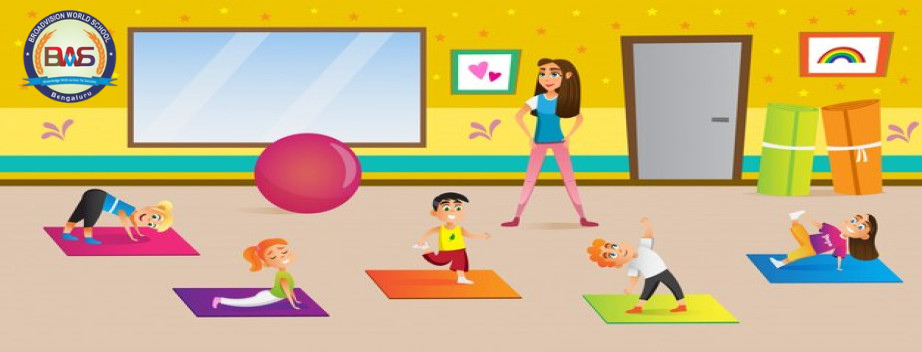Giving your child the best start in life
-
First Floor, 10A Chandos Street London New Town W1G 9LE
Get In Touch
Monday to Friday: 8.30am – 02.00pm
Saturday, Sunday: Close
Email: user@domainname.com
Phone: +44 (0) 207 689 7888

In the quest to enhance children’s academic performance, physical activity emerges as a vital component often overshadowed by more traditional educational strategies. Numerous studies have shown that Regular Exercise can significantly impact students’ learning abilities and focus. But how exactly does this work, and what are the best ways to incorporate exercise into a child’s daily routine to boost their academic success? Lets Discuss also how Broadvision World School help children to enhance their physical health as well as mind.
A growing body of research indicates a strong link between Physical Activity and academic performance. Studies have consistently demonstrated that children who engage in regular exercise tend to perform better academically. For example, a study published in the Journal of School Health found that students who participated in physical education classes showed improved grades and test scores compared to their less active peers.
Creating a pre-study routine that includes Physical Activity can be beneficial. For example, a 5-minute exercise routine that combines jumping jacks, stretching, and deep breathing exercises can set the stage for a productive study session.

Physical education (PE) plays a crucial role in developing strong muscles, bones, and overall cardiovascular health. Regular exercise through PE classes can help prevent obesity and other health issues associated with a sedentary lifestyle. This foundation of physical health is essential for a student’s growth and well-being.
Engaging in physical activities has significant benefits for mental health. Exercise helps reduce symptoms of anxiety, depression, and stress. It fosters a positive mood and overall mental well-being, contributing to a more balanced and happy student life.
PE classes provide students with opportunities to work in teams, which helps in building teamwork and developing social skills. Working together in sports and physical activities promotes communication, cooperation, and mutual respect among peers.
There is a strong link between regular Physical Activity and improved academic performance. Students who engage in regular exercise tend to have better grades and higher standardized test scores. Physical activity stimulates brain function and improves cognitive abilities, which translates into better learning outcomes.
Physical activity helps students build emotional resilience by teaching them how to cope with challenges and setbacks. This resilience is crucial for handling the ups and downs of academic and personal life, making students more adaptable and persistent.
Exercise is an effective method for managing stress and anxiety. By reducing stress levels, students can enhance their overall academic performance. Regular physical activity provides an outlet for stress and helps maintain a calm and focused mind.
Participating in physical activities improves focus and concentration. This enhanced mental clarity is essential for learning and academic success, as it helps students stay attentive and engaged during lessons.
Regular physical activity contributes to building self-confidence and self-esteem. As students achieve their fitness goals and improve their physical abilities, they gain a sense of accomplishment and self-worth, which positively impacts their self-image.
Exercise promotes better sleep quality. Quality sleep is essential for cognitive function and academic performance. By improving sleep patterns, physical activity supports overall mental and physical health, which in turn benefits academic success.
PE helps students develop valuable life skills such as discipline, time management, and perseverance. These skills are not only important for success in physical activities but also transfer to other areas of life, including academics and personal endeavors.
Overall, physical education is vital for fostering a well-rounded development in students, impacting their physical health, mental well-being, academic performance, and personal growth.
How Exercise Boosts Cognitive Functions
Incorporating Physical Activity into study routines can enhance cognitive functions such as memory, attention, and problem-solving skills. For instance, taking short breaks to do a few stretches or quick exercises can help refresh the mind and improve focus.
Incorporating Movement Into Study Routines
Simple movements like standing up, stretching, or walking around during study breaks can help maintain concentration and prevent fatigue.
Case Studies and Real-Life Examples
Schools that integrate physical education programs see significant improvements in student performance. For example, a case study from a school district in Texas showed that students who participated in daily physical education classes had higher test scores and better overall academic performance.
Policies and Programs Promoting Physical Activity
Many schools are adopting policies that encourage regular Physical Activity, such as longer recess periods, more frequent physical education classes, and after-school sports programs.
The Science Behind Exercise and Focus:
Exercise enhances concentration by increasing blood flow to the brain. This boost in blood circulation helps improve cognitive functions and mental clarity. Additionally, physical activity stimulates the release of neurotransmitters, which are chemicals in the brain that are crucial for maintaining focus and mental alertness.
Mechanisms of Improved Concentration:
Regular physical activity can help extend attention spans and reduce distractions. This makes it easier for students to focus on their studies and absorb information more effectively.
Evidence from Academic Studies:
Research supports the idea that exercise improves focus in students. For example, a study published in the journal Pediatrics found that children who engaged in regular physical activity showed better attention and less impulsivity in classroom settings compared to their less active peers.
Parents and teachers can support students’ focus by encouraging them to be physically active. This could include integrating movement breaks into study routines or setting aside time for Regular Exercise each day. Simple strategies, such as scheduled exercise breaks, can significantly enhance concentration and academic performance.
Comprehensive Benefits Overview:
Exercise offers numerous benefits for children, including:
Long-term Effects on Children’s Health:
Regular Exercise helps reduce the risk of chronic diseases, supports mental health, and contributes to better academic performance, fostering long-term well-being.
Neurological Impacts of Physical Activity:
Exercise benefits brain health by increasing blood flow, stimulating the release of growth factors, and enhancing neuroplasticity (the brain’s ability to reorganize itself). These effects support better cognitive function and learning abilities.
Cognitive Development and Exercise:
Regular Exercise plays a role in cognitive development by improving memory, attention, and problem-solving skills. These cognitive benefits translate into better academic performance and learning outcomes.
Psychological and Emotional Benefits:
Exercise helps manage stress, anxiety, and depression in children. It also promotes a positive mood and overall emotional well-being.
Impact on Behavior and Mood:
Regular Exercise can lead to better behavior and mood regulation. These improvements can positively impact academic performance and social interactions.
Behavioral Improvements Linked to Physical Activity:
Exercise helps address behavioral issues such as hyperactivity and aggression. It also encourages positive behaviors like cooperation and focus.
Strategies for Incorporating Exercise Into Daily Routines:
To improve behavior, incorporate physical activity into daily routines. This can include scheduled breaks for exercise, active classroom activities, and encouraging participation in sports.
Cognitive Growth and Development Through Exercise:
Physical activity supports intellectual development by enhancing brain function and cognitive abilities. This includes better memory, attention, and problem-solving skills, which contribute to improved academic performance.
Academic Benefits Associated With Regular Physical Activity:
Students who regularly engage in physical activity often show higher test scores and better grades, reflecting the positive impact of exercise on their academic achievements.
Importance of Structured Physical Education Programs:
Structured physical education (PE) programs are crucial for child development. They promote physical health, cognitive growth, and social skills through organized activities and learning experiences.
Role in Overall Child Development:
PE supports overall development by offering opportunities for physical activity, social interaction, and cognitive learning. This comprehensive approach helps children grow in multiple areas, including physical health, mental well-being, and social skills.
Childhood obesity is a growing concern worldwide. Helping children maintain a healthy weight is essential for their long-term well-being. By incorporating the following strategies, parents can support their kids in developing healthier habits:
1. Encourage Balanced Eating
A well-balanced diet rich in fruits, vegetables, lean proteins, and whole grains is key to managing weight. Avoid sugary snacks and processed foods. Portion control is important, as overeating can lead to unnecessary weight gain. Make meal planning fun by involving your child in the process.
2. Promote Regular Physical Activity
Children need at least 60 minutes of physical activity daily. This could include playing outside, sports, or dancing. Keeping active helps burn calories and build strength. Make it a family affair by exercising together and turning it into a fun routine.
3. Limit Screen Time
Excessive screen time can lead to a sedentary lifestyle and unhealthy snacking habits. Set reasonable limits on TV and mobile use, encouraging your child to engage in more active hobbies like outdoor play or sports.
4. Foster Healthy Sleep Habits
Sleep plays an important role in weight management. Children need sufficient rest to support their growth and health. Establish consistent bedtime routines to ensure they get enough sleep.
5. Be a Positive Role Model
Children learn from their parents. Show them the importance of a healthy lifestyle by making good food choices and staying active yourself.
By following these steps, you can help your child maintain a healthy weight and develop lifelong habits that promote well-being.
Broadvision World School is committed to enhancing students’ academic performance and overall well-being through a balanced approach that incorporates physical activity into their daily routines. Understanding the profound impact of exercise on learning and focus, the school has developed a comprehensive strategy to integrate physical activity into its educational framework. Here’s how Broadvision World School effectively manages exercise to benefit students’ academic and personal growth.
Structured Physical Education Programs
Broadvision World School offers a robust physical education (PE) program designed to promote physical fitness and cognitive development. The PE curriculum is carefully crafted to include a variety of activities that cater to different interests and skill levels, ensuring that all students engage in regular physical exercise. These programs are scheduled consistently throughout the week to reinforce the importance of physical activity in daily life.
Active Classroom Breaks
To maintain students’ focus and energy levels, the school incorporates short, active breaks into the classroom schedule. These breaks include activities like stretching exercises, quick physical games, and movement-based tasks. By integrating these breaks, teachers help students stay alert and engaged, improving their concentration and learning outcomes.
After-School Sports and Extracurricular Activities
Broadvision World School provides a wide range of after-school sports and extracurricular activities that encourage students to stay active beyond the classroom. The school offers various sports programs, including soccer, basketball, and swimming, as well as non-traditional activities like dance and martial arts. These programs not only promote physical fitness but also help students develop teamwork, leadership, and social skills.
Encouraging Participation in School Events
The school actively encourages students to participate in physical activities through events such as sports day, fitness challenges, and charity runs. These events are designed to foster a sense of community and motivate students to engage in physical exercise while having fun.
Guidance for Parents
Broadvision World School understands the importance of supporting physical activity beyond school hours. To help parents encourage their children to stay active at home, the school provides resources and tips on incorporating exercise into daily routines. These resources include suggestions for family activities, home exercise routines, and information on the benefits of physical activity for children.
Promoting a Healthy Lifestyle
The school promotes a healthy lifestyle by organizing workshops and seminars for parents on the benefits of physical activity and nutrition. These sessions provide valuable information on how parents can support their children’s physical health and academic performance.
Regular Assessments and Feedback
Broadvision World School continuously evaluates the effectiveness of its physical activity programs through regular assessments and feedback from students, parents, and teachers. The school uses this feedback to make data-driven decisions and adjustments to ensure that the programs meet the needs of all students.
Tracking Academic and Behavioral Improvements
The school monitors academic performance and behavioral changes to assess the impact of physical activity on students’ learning and focus. By analyzing these outcomes, Broadvision World School can identify the positive effects of exercise and make informed adjustments to enhance the overall effectiveness of its programs.
Creating an Inclusive Environment
Broadvision World School is dedicated to creating an inclusive environment where all students feel welcome to participate in physical activities. The school ensures that programs are accessible to students of all abilities and encourages a positive attitude towards exercise and fitness.
Celebrating Achievements
The school celebrates students’ achievements in physical activities and sports, recognizing their efforts and progress. By highlighting these accomplishments, Broadvision World School fosters a sense of pride and motivation among students, encouraging them to continue pursuing physical activities.
Broadvision World School’s approach to integrating physical activity into its educational framework demonstrates a strong commitment to enhancing students’ academic performance and overall well-being. By offering structured PE programs, incorporating active breaks, promoting after-school sports, supporting physical activity at home, and continuously evaluating the impact, the school effectively manages exercise to boost students’ learning and focus. This holistic approach not only supports academic success but also contributes to the development of healthy, well-rounded individuals.

Comments are closed